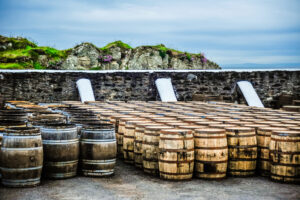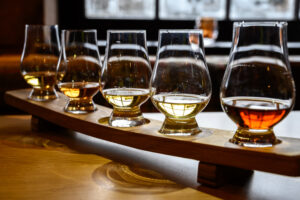In Scotland, you won't find many items that are more closely linked to Scotland's identity than Scotch whisky. Distilled across the country for centuries, this world-renowned spirit is steeped in tradition and character. From remote island distilleries to Speyside giants, Scotland's whisky heritage plays a significant role in its culture and the Scottish economy.
We explore how it is produced and distilled, what makes Scotch unique, and the five whisky regions that give it such a rich diversity of flavour.
Making Scotch involves just three core ingredients. Water, malted barley, and yeast, with each step contributing to its character.
Malting – Soaking the barley in water, allowing it to germinate, and then drying it to complete the malting process.
Mashing – In this process, the malted barley is ground and mixed with hot water to extract sugars, creating a liquid known as "wort."
Fermentation – Distillers add yeast to the wort, which turns the sugars into alcohol and creates a beer-like liquid called "wash."
Distillation – Distillers usually distil the wash twice in copper pot stills to increase alcohol strength and purify the flavour.
Maturation – For a minimum of three years in Scotland, Whisky is aged in oak casks/barrels. Most distilleries age their whisky for well beyond the minimum three years in a cask or barrel.
The choice of the barrel plays a significant role in the Whisky's aroma and taste.

Scotland is home to five official whisky regions, each producing whiskies with distinct profiles:
The Highlands produce a wide variety of whisky styles. Expect bold, full-bodied expressions with flavours ranging from floral and fruity to smoky and spicy. Notable distilleries include Dalwhinnie, Glenmorangie, and Oban.
Located within the Highlands but classed as its own region, Speyside has the highest concentration of distilleries. Whisky drinkers recognise Speyside for its smooth, elegant, and often fruity character. Glenfiddich, Macallan, and Glenlivet are key names in this region.
Whisky lovers know this small island off Scotland's west coast for its powerful, smoky, peated expressions. The maritime climate adds briny, medicinal notes. Laphroaig, Lagavulin, and Ardbeg are iconic Islay producers.
Lowland Scotch is typically light, floral, and easy to drink. Ideal for newcomers to Whisky. Auchentoshan and Glenkinchie are among the most famous distilleries in this region.
Once home to dozens of distilleries, Campbeltown now has only three active distilleries remaining, although it remains a highly respected region. Expect coastal, slightly briny whiskies with a complex character. Springbank Distillery is the standout in this region.
UK and EU law grant Scotch whisky Protected Geographical Indication (PGI) status, requiring producers to distil and mature it in Scotland using traditional methods. This regulation helps preserve the heritage and quality of the spirit. Scotland's natural environment, long ageing process, and deep-rooted culture of craftsmanship have earned Scotch its international prestige and global popularity.

While Scotland boasts over 140 active distilleries, here are a few that represent different regions and blends,
Most distilleries in Scotland are open to visitors and offer guided tours and tastings. Whether you follow the Malt Whisky Trail in Speyside, explore the windswept distilleries of Islay, or enjoy a short trip from Edinburgh to Glenkinchie, whisky tourism is a great way to immerse yourself in Scottish culture. It's best to book tours in advance, as distillery tours often sell out during peak travel months.
In Scotland, we spell Whisky without the "e." Ireland and the United States use "whiskey." It's a regional spelling difference.
To qualify as Scotch, producers must make the Whisky in Scotland, mature it in oak casks for at least three years, and follow strict production standards.
Yes, distilleries across Scotland welcome visitors. Please check that the distillery you want to visit welcomes visitors for tours and tastings.
Legally, for a minimum of three years. However, many distilleries age their whisky for much longer. Some whiskies mature for 10, 12, or even 18 years or more to develop greater depth and complexity.
Single malt is made using 100% malted barley at a single distillery. It's distilled in pot stills and is often viewed as the most traditional form of Scotch.
